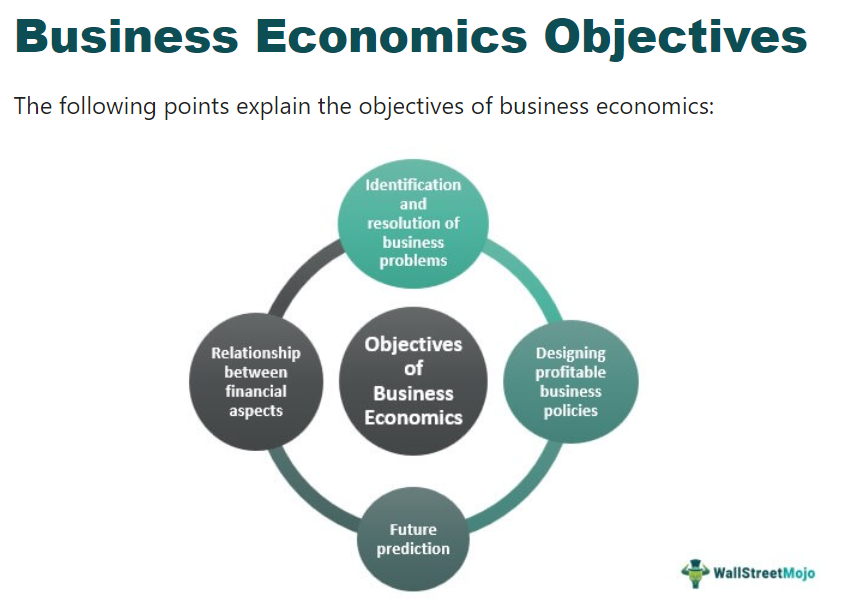The Role of Business Economics in Business Technique: Insights for Business Owners
The integration of economic principles into business method is vital for business owners intending to navigate intricate market environments. By realizing principles such as supply and need, chance cost, and market structures, service leaders can craft techniques that not just deal with current market problems but also prepare for future trends.
Comprehending Financial Concepts
While numerous magnate concentrate on operational methods, a solid grasp of economic principles is necessary for educated decision-making and calculated planning. Comprehending ideas such as supply and need, possibility cost, and market frameworks can seriously shape a service's approach to competition and resource allowance.
Supply and need characteristics determine pricing techniques and inventory administration. For example, acknowledging changes in customer preferences permits companies to change their offerings proactively, boosting and optimizing sales client fulfillment. Opportunity price, the value of the next best alternate inevitable, urges leaders to evaluate the possible benefits of various calculated options, making certain resources are allocated effectively.
Furthermore, familiarity with market frameworks, such as perfect competitors, syndicate, and oligopoly, notifies competitive positioning and pricing approaches. A deep understanding of these financial structures enables leaders to anticipate market changes and respond suitably, taking advantage of and minimizing threats on possibilities.
Eventually, the combination of financial concepts into business method not just promotes better functional choices yet additionally promotes resilience in an ever-evolving marketplace. By focusing on economic literacy, business owners can improve their strategic insight, making sure sustainable development and an one-upmanship.
Market Need Evaluation
Recognizing market need helps companies anticipated sales volumes and adjust their stock administration appropriately. It additionally permits firms to identify market segments that are underserved or hold significant growth capacity (Business and Economics). Furthermore, examining financial indications and seasonal variations can give valuable context for need changes over time
Furthermore, a robust market demand evaluation makes it possible for business owners to make informed decisions about product development and marketing techniques. By aligning their offerings with consumer need, organizations can boost consumer satisfaction and loyalty.

Rates Approaches and Techniques
Recognizing market demand not just notifies product offerings but also plays a significant duty in forming efficient pricing approaches. Entrepreneurs should assess customer behavior and desire to pay, as these factors are essential in establishing a price factor that takes full advantage of earnings while remaining eye-catching to clients.
One commonly used rates technique is value-based prices, where costs are set based on regarded worth instead than price. This approach makes certain that all costs are covered yet may overlook market problems.
Dynamic prices is an additional innovative method, permitting organizations to readjust prices in real-time based upon need variations. This strategy is specifically effective in markets such as traveling and hospitality, where customer demand varies dramatically.
In addition, emotional prices, such as setting costs just listed below a round number (e.g., $9.99 rather than $10), can influence client understanding and acquiring choices. By using a combination of these strategies, entrepreneurs can successfully position their items in the market and enhance success.
Competition and Market Framework
In the world of business strategy, the nature of competition and market framework plays an essential duty in identifying a company's technique to achieving a competitive benefit. Understanding the characteristics of competitors helps entrepreneurs determine their market placement and dressmaker techniques appropriately. Market structures can usually be categorized as excellent competition, monopolistic competition, oligopoly, and monopoly, each offering unique challenges and possibilities.
In a perfectly affordable market, companies compete mainly on rate, necessitating a concentrate on expense performance and innovation to preserve margins. Alternatively, in monopolistic competitors, differentiation through branding and customer support comes to be important. Oligopolistic markets, defined by a couple of leading gamers, call for companies to be acutely familiar with rivals' activities, bring about strategic interdependence. Lastly, monopolies enable for prices power, yet additionally impose scrutiny from regulative bodies.

Customer Behavior Insights
How do consumer choices and actions affect business techniques in a competitive landscape? By examining fads, preferences, and buying patterns, services can customize their offerings to meet the evolving needs of their target market.
Data-driven insights into customer habits permit firms to sector their markets effectively, identify essential demographics, and establish targeted advertising and marketing projects. For circumstances, organizations can leverage behavioral analytics to anticipate shifts in consumer demand and adjust their inventory, pricing, or promotional techniques appropriately. This responsiveness not only improves client contentment but likewise promotes brand name commitment and retention.
Furthermore, recognizing customer actions can notify item advancement, allowing business to innovate and develop services that resonate with their audience. In a landscape defined by fast change and intense competitors, remaining attuned to consumer preferences is necessary. Inevitably, the capability to adapt business approaches based on customer understandings can considerably impact a business's success and sustainability in the marketplace.
Verdict
To Read Full Report conclude, the integration of financial principles right into company approach is necessary for entrepreneurs intending to navigate complicated market environments - Business and Economics. A detailed understanding of market demand, rates techniques, competitors, and consumer actions equips organizations with the tools essential to adapt and grow. By leveraging these understandings, entrepreneurs can make enlightened decisions that the original source line up with market characteristics, ultimately improving strength and promoting lasting development in an ever-evolving competitive landscape
The combination of financial principles into service strategy is important for business owners aiming to navigate intricate market environments. By comprehending principles such as supply and demand, chance price, and market structures, company leaders can craft approaches that not just address current market conditions however additionally anticipate future patterns.A detailed market demand analysis is important for businesses aiming to maximize their product offerings and pricing approaches.In conclusion, the combination of financial concepts right into business technique is necessary for business owners intending to navigate complex market atmospheres. A detailed understanding of market need, rates approaches, competition, and consumer behavior equips companies with the tools required to prosper and adjust.
Comments on “Understanding How Business and Economics Shape Buying Decisions”